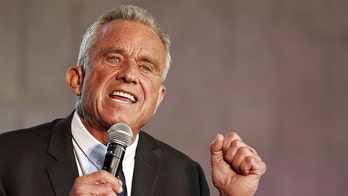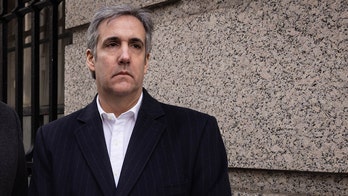Major Surgery Ahead for Obamacare
"We're running numbers to see how many new people we can get into the pool with something less than a mandate, something that would be more limited enrollment periods with severe financial penalties for not signing up."
-- Sen Claire McCaskill, D-Mo., talking to Politico about her efforts to repeal the provision for mandatory health insurance in President Obama's national health care law.
Democrats are getting on the record with their opposition to the controversial provision of President Obama's national health-care law that requires all Americans to purchase private insurance or be enrolled in an approved government program.
Sens. Claire McCaskill, D-Mo., John Tester, D-Mont., and Joe Manchin, D-W.Va. are reportedly looking at an alternative to the rule at the heart of the Obama law and at the heart of a constitutional challenge to it now moving through federal court. They also all happen to be facing brutal reelection bids next year.
Nebraska Democratic Sen. Ben Nelson has been calling for such a change for months, and Oregon Democratic Sen. Ron Wyden has a bill on offer that would allow states to opt out of the mandate. With 27 states suing to block the mandate, it stands to reason that many would jump out of the system.
The White House has been careful to not stomp on this line too hard, instead saying that the president is open to "improving" the law and making some changes. But they are not the kind of changes he has in mind since the removal of the mandate would essentially undo his signature legislative achievement.
Without the government forcing healthy people to buy insurance, companies cannot afford to extend coverage for the sick people to whom the government will force them to sell policies. The loss of the mandate would turn Obama's law on its head.
How much of this discussion is posturing and how much is sincere remains to be seen. Remember that McCaskill is a longtime Obama insider and made sure to disclaim in talking about the mandate that if it is the only way to provide universal coverage, she would keep it.
Obama once campaigned against the concept of a mandate back when it was at the heart of Hillary Clinton's health care proposal. But even if Obama wasn't thrilled about being the president who championed compulsory insurance, he is now wedded to the idea. Without it, his law would go from being a history-making achievement to a muddled mess.
Meanwhile, the law is under assault from governors seeking waivers from expensive Medicare requirements and other states are looking at halting implementation of provisions while the legal fate of the law remains in doubt. This, along with the lawsuit itself, increases the pressure on red-state Democrats to make substantive changes to the law.
For now, the president is playing for time. The White House can indulge some theoretical discussions among Democrats about changes to the law. Pushing back too hard would endanger his effort to cultivate a new centrist image. But the day is coming soon when the president will have to dig in to defend his law.
Tax Rates Could Vary By Industry
"It might vary by industry, it might vary by company -- what's the fairest way to do this. But the overall principle that the president set forth is -- we want to bring it down."
-- Senior White House Adviser Valerie Jarrett on Fox Business Network.
The good news for business: President Obama wants to cut taxes on profits by $1 trillion. The bad news? Somebody has to pay for it.
In his speech to the U.S. Chamber of Commerce, Obama reiterated his plan to reduce the U.S. corporate tax rate, the highest in the industrialized world, in order to spur investment at home. But we also got a look at how he plans to keep the shift "revenue neutral."
The proposal taking shape is one in which different industries might be taxed at different rates, rates that would presumably reflect the administration's focus on "equity, human dignity, fairness and distributive impacts" as outlined in the president's order calling for a review of federal regulations.
What is being discussed would essentially be a corporate sin tax. Rates could reflect the desirability of different industries in the eyes of the government. Presumably, polluters or those that paid low wages would be taxed at different rates than those who make green energy products and have unionized work forces.
This already happens to some extent in the form of tax credits. The base rate is the same for everyone, but those with political clout get special incentives. That, ironically, includes both the oil industry and the green energy crowd. Both groups have leveraged Washington influence very effectively to get preferential treatment.
But, the possibility that the rates themselves could vary on the basis of political desirability would set of a stampede of lobbying likely never seen before. Every industry would beat a path to the White House door looking for the chance to get the low rate for friends, not the high rate for enemies.
How likely this is to survive contact with legislative reality is unknown but anything that brings power and attention to Washington is always certain to get at least a second look in Congress.
Plus, that negotiation would be a considerable enticement to corporate donors in advance of a big election.
Mubarak Redefines "Transition"
"All that I know is that if I had accepted the job on Sunday last week, the measures taken against me would not have happened."
-- Rachid Mohamed Rachid, Egypt's former trade and industry minister, telling The Financial Times that the new corruption investigation into his tenure by the Mubarak regime is a search for scapegoats to appease the mobs.
The Mubarak regime in Cairo is looking to retrench itself as the Muslim Brotherhood looks to shore up its position as Egypt's leading opposition group.
But we don't what the American position on either of these developments is. Part of that may be deliberate ambiguity since whatever America wants will be seen as less desirable by the remaining protestors in the streets. Part may also be actual indecision.
The Obama administration has called on Egyptian President Hosni Munarak many times to begin a transition process, but has always stopped short of saying that the 30-year ruler needed to step down immediately.
And there certainly seems to be transition inside the Egyptian government. The favorites of Mubarak's son, Gamal, have been rounded up, along with others involved in the nation's effort at economic modernization over the past decade. While Gamal's intimates are thought to have exploited new free market reforms to create crony capitalism, others may just have backed the wrong political horse in their bid for economic reform.
With Gamal and his associates out of the picture, Mubarak's designated successor, Omar Suleiman, can work to consolidate the nation's ruling party around a transition plan. By wiping out Gamal's power base, Suleiman and Mubarak can reassure those inside their own party that there is no chance of hereditary succession any more.
The Muslim Brotherhood, meanwhile, has broken off its negotiations with Suleiman's team, returning to the side of other protest groups who have maintained that no negotiations are possible as long as Mubarak himself remains in power.
The protesters in Tahrir Square occupy a makeshift village guarded/sealed off by the nation's military. They can chant, they can tweet, but risk becoming a piece of colorful furniture. With the military in control, the protestors are safe, but without the threat of violence that originally compelled the world to hear their demands.
If Mubarak feels that there is less risk of actual overthrow and his own party seems well positioned to retain majority control in the September elections, he might be convinced that his own departure would not bring chaos and would step down before September.
On the other hand, the longer Mubarak stays in power now and the more calm returns to Cairo, the less impetus there is for him to leave early at all.
The unanswered question for the Obama administration is: Is it acceptable for Hosni Mubarak to remain in power until September?
Dem Allies Might Help GOP Leaders Broker Budget Deal
"In the coming weeks, the Blue Dogs are going to be discussing cuts in more detail, and maybe we will be able to come to some type of consensus."
-- Rep. Mike Ross, D-Ark., talking to The Hill newspaper.
The House Blue Dog caucus is barking a bunch these days in a bid for relevancy after losing half of its members following the 2010 elections.
One of the potential proposals is to back House Budget Committee Chairman Paul Ryan's plan to roll back discretionary spending for the remainder of the fiscal year. Another potential area of agreement with Republicans would be making an increase in the debt ceiling conditional on other spending cuts.
This is significant because it gives Republican leaders leverage with dealing with the fiscal hardliners in their own caucus. The Blue Dogs may only have 26 votes in the new Congress, but those votes could help Speaker John Boehner and Majority Leader Eric Cantor deal with Tea Party members who insist on even deeper cuts.
The Blue Dogs mostly went along with the Democratic majority in the previous Congress, but the remaining members are more conservative ones, like Rep. Heath Shuler, D-N.C., who survived by drawing sharp distinctions between themselves and Speaker Nancy Pelosi.
The group is having a policy retreat this week to figure out the way forward. Their only options for relevancy involve finding ways to work with moderate Republicans to advance right-of-center fiscal policies. The question is how far they are willing to go down that path.
TSA Union Meets Senate Test
"Frankly, I think many observers would conclude that the current administration is intent on doling out rewards to campaign supporters, and therefore is moving to reverse this decade-old decision and allow for collective bargaining among TSA employees."
-- Sen. Roger Wicker, R-Miss., on the Senate floor.
There are 50,000 employees in the Transportation Security Administration, and a new Obama administration policy would grant them the right to collective bargaining on some issues, including scheduling.
But collective bargaining could mean that if the agents' union doesn't like how workers are being assigned, they might shut down airport security.
As the Senate continues work today on an FAA funding bill, Mississippi Sen. Roger Wicker and some allies want to bring forward an amendment blocking the Obama administration from changing the labor rules for the TSA. The vote may have to wait until next week, but Republicans are banging the war drums over this one.
You may recall that during the legislative fight over the creation of the Department of Homeland Security, the Bush administration reached a compromise with Democrats that allowed union representation (and dues collection) from workers, but denied agents the power of collective bargaining. You may also recall that when all three nominees for TSA administrator were presented to the Senate by Obama, they were all asked their position on this issue, and all three, including eventual appointee John Pistole, essentially ducked the question.
They ducked because there is considerable bipartisan concern about having to negotiate labor contracts in such a sensitive area. Public safety workers have generally been limited to using dues for campaign activities and making endorsements of candidates who promise favorable treatment, but barred from withholding services as part of a negotiation.
There is a law on the books that forbids strikes by government employees, but it relies on presidential action (as Ronald Reagan did with Air Traffic Controllers in 1981). And, the granting of collective bargaining rights brings all sorts of new labor laws and oversight panels into play in the event of labor disputes.
The workers may not be allowed to strike, but the government would not be allowed to insist on new duties or job descriptions if the union objected.
Wicker's amendment is the first salvo in an effort by Republicans in Congress to curtail the president's ability to achieve through regulations what he has been unable to accomplish through legislation. The willingness of moderate Democrats to sign on to this amendment will be an indicator of how much appetite there is in the Democratic caucus to buck the president on key issues like mandatory health insurance and global-warming fines.
And Now, A Word From Charles
"There is nothing in here except for repetition four times of his slogan 'Win the Future,' which we now know is going to be the slogan of (the) presidential campaign. It will be 'Yes, we can.' That's how it starts. And it ends with 'Win the Future.' So I think Obamaism can be summarized in one sentence 'Yes, we can win the future.'"
-- Charles Krauthammer on "Special Report with Bret Baier" discussing President Obama's speech to the U.S. Chamber of Commerce.




